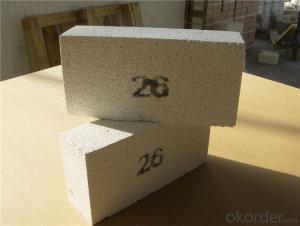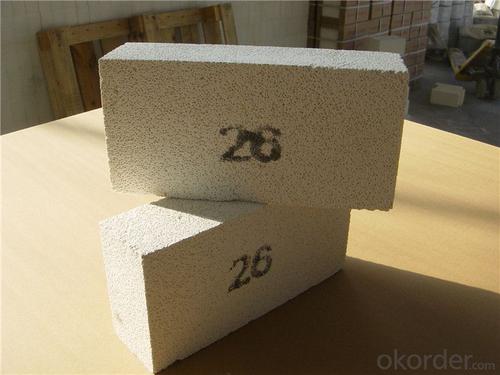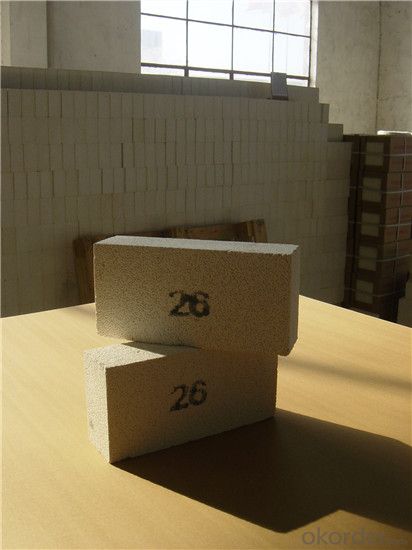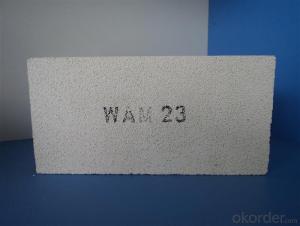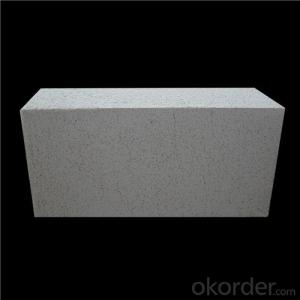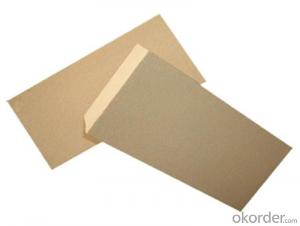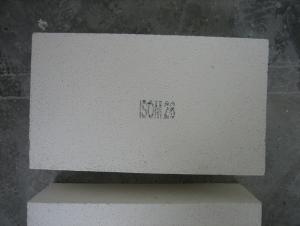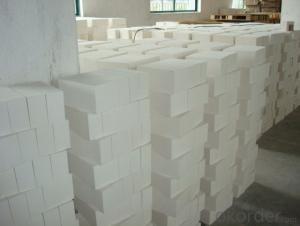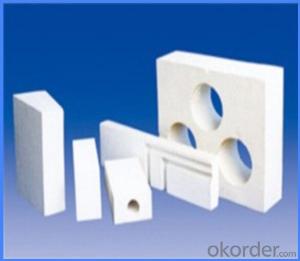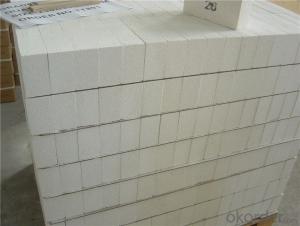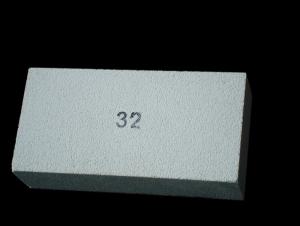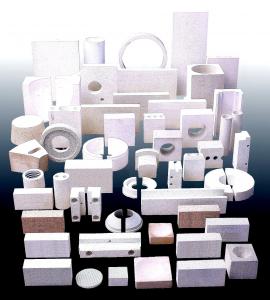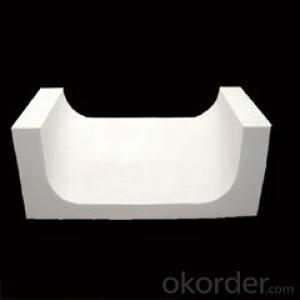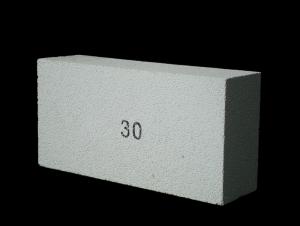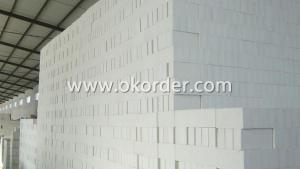Insulating Fire Brick - Mullite Insulating Brick for Furnaces and Kilns (DJM26)
- Loading Port:
- Tianjin
- Payment Terms:
- TT OR LC
- Min Order Qty:
- 2 m.t.
- Supply Capability:
- 1000 m.t./month
OKorder Service Pledge
OKorder Financial Service
You Might Also Like
Thermal Insulation Fire Clay Brick
DJM 26 Light Weight Insulating fire brickconforms strictly to the requirements of ISO 9000 quality control system during the production. MSDS is also available if you want. The thermal insulation fire clay brick meet with the requirements of ASTM & JIS standards. So please stay cool with our quality.
(1) Low density
(2) Low conductivity
(3) Great resistance to thermal shock
(4) Low linear shrinkage
(5) High contain of mullite crystal
(6) Accurate in dimension.
Application
DJM 26 Light Weight Insulating fire brick are used for the lining of converter, alternating current arc furnace, direct Current arc furnace and the ladle slag line, etc.
Company Advantage
(1)Long Insulating Fire Brick manufacture history: 25 years manufacturer
(2)Advanced equipment
(3)Diversification of production standards: ISO ANSI FEPA JIS ASTM
(4)Flexible payment: T/T L/C D/P D/A
(5)Professional marketing team and after-sale service
(6)Free sample
Equipment
1 unit of Ceramic Abrasive (SG Abrasive) pilot production line
1 unit of high-end coated abrasives (abrasive cloth) production line
2 units of Boron Carbide production lines
Q1 What’s the transport method?
A1 FCL delivery goods with wooden pallet or wooden case by sea; If LCL delivery, must with wooden case; Sometimes need open top, flat rack or bulk cargo.
Q2 What’s the required payment term?
A2 Generally 30% TT as the prepayment, 70% TT before delivery. If need, 100% Irrevocable Letter of Credit or negotiation.
Q3 Which country are our products exported to?
A3 Apart from entire Chinese market, the US, Russia, Japan, Korea, Australia and some Southeast Asian Nations.
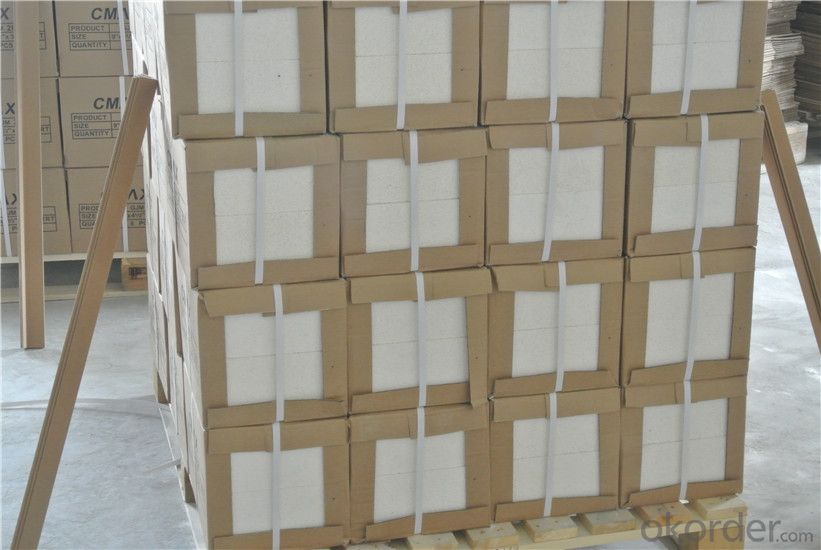
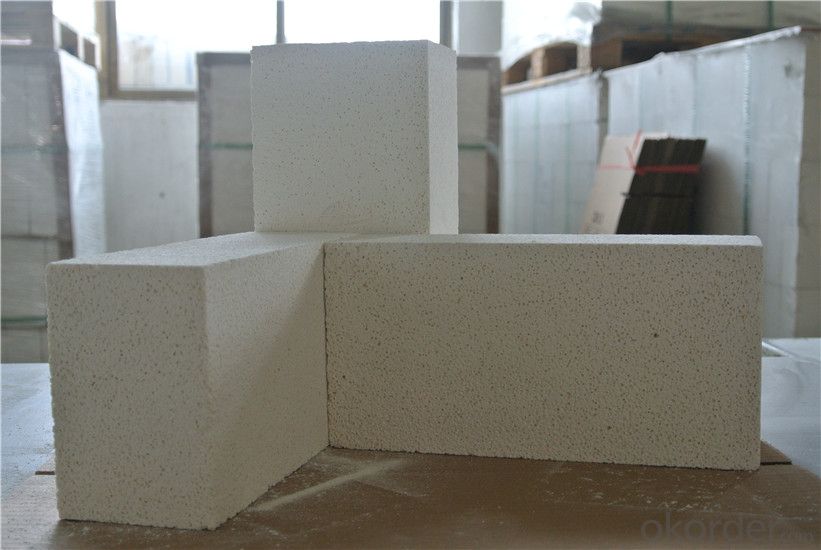
- Q: Can insulating fire bricks be used in the construction of rotary kilns?
- Indeed, the utilization of insulating fire bricks is feasible in the fabrication of rotary kilns. These bricks are specially engineered to deliver exceptional thermal insulation, rendering them exceptionally well-suited for scenarios where heat retention is of utmost importance. In the establishment of rotary kilns, insulating fire bricks may be employed as a lining material to mitigate heat dissipation from the kiln and augment its energy efficiency. Not only that, but these bricks also possess commendable resistance to thermal shock, a quality of paramount significance in the high-temperature milieu of a rotary kiln. On the whole, the incorporation of insulating fire bricks in the construction of rotary kilns can significantly enhance their performance and curtail energy consumption.
- Q: What are the safety precautions when working with insulating fire bricks?
- When working with insulating fire bricks, it is important to follow several safety precautions to ensure the well-being of yourself and others. Here are some key safety measures to consider: 1. Personal protective equipment (PPE): Wear appropriate PPE, including heat-resistant gloves, long-sleeved clothing, safety goggles, and a respiratory mask. These will protect you from potential burns, cuts, and inhalation of harmful dust or fumes. 2. Proper ventilation: Work in a well-ventilated area or use local exhaust ventilation to minimize exposure to dust and fumes that may be released during handling or cutting of the bricks. 3. Fire prevention: Keep a fire extinguisher nearby and ensure the workspace is clear of flammable materials. Insulating fire bricks are highly refractory and can withstand high temperatures, but it is still important to prevent accidental fires. 4. Manual handling: Insulating fire bricks can be heavy, so use proper lifting techniques and avoid overexertion to prevent strains or injuries. If necessary, use mechanical aids such as trolleys or lifting equipment to move the bricks. 5. Cutting and grinding: When cutting or grinding the bricks, use appropriate tools and ensure they are in good working condition. This will minimize the risk of accidents or injuries. Be cautious of sharp edges and wear protective gloves to avoid cuts. 6. Temperature control: Insulating fire bricks are designed to withstand high temperatures, but avoid direct contact with hot surfaces. Use appropriate tools or equipment to handle the bricks when they are at an elevated temperature. 7. Storage and handling: Store the bricks in a cool, dry place away from direct sunlight or extreme temperatures. Avoid stacking them too high to prevent the risk of collapse or toppling. 8. Training and knowledge: Ensure you have received proper training and are familiar with the characteristics and properties of insulating fire bricks. Understand their limitations and follow the manufacturer's guidelines for safe handling and usage. By adhering to these safety precautions, you can significantly reduce the risk of accidents, injuries, and health hazards when working with insulating fire bricks. Remember, safety should always be a top priority in any workplace.
- Q: Are insulating fire bricks resistant to hydrogen sulfide?
- In general, hydrogen sulfide is not withstood by insulating fire bricks. This highly corrosive gas has the ability to react with various substances, including fire bricks. Fire bricks, although engineered to endure high temperatures, lack a specific resistance to chemical corrosion. Consequently, when fire bricks encounter hydrogen sulfide, they may deteriorate gradually, resulting in possible harm or malfunction. Hence, it is advisable to employ alternative materials specifically crafted to withstand corrosion caused by hydrogen sulfide in situations where this gas is anticipated.
- Q: Can insulating fire bricks be used in the construction of radiant tubes?
- Yes, insulating fire bricks can be used in the construction of radiant tubes. Insulating fire bricks are specially designed to provide excellent thermal insulation, making them ideal for applications where heat retention is important. Radiant tubes are used in high-temperature environments, such as furnaces and kilns, where they are exposed to extreme heat. Insulating fire bricks can withstand these high temperatures and help to minimize heat loss, resulting in improved energy efficiency. Additionally, the insulating properties of these bricks can also help to protect the radiant tubes from thermal shock and prolong their lifespan. Overall, using insulating fire bricks in the construction of radiant tubes can enhance their performance and durability.
- Q: Are insulating fire bricks resistant to abrasion or erosion?
- Insulating fire bricks lack resistance to abrasion or erosion in general. Despite their exceptional heat insulation properties, they are typically constructed from materials that are not intended for enduring high levels of deterioration. Insulating fire bricks are commonly employed in scenarios that do not involve substantial mechanical forces or abrasive substances. If worries about abrasion or erosion arise, it may be more appropriate to consider an alternative refractory material or lining for the particular application.
- Q: Can insulating fire bricks be used in fireplaces?
- Yes, insulating fire bricks can be used in fireplaces. They are designed to withstand high temperatures and provide excellent insulation, making them suitable for lining the inside of fireplaces.
- Q: Can insulating fire bricks be used in brick kilns?
- Yes, insulating fire bricks can be used in brick kilns. Insulating fire bricks are designed to have high thermal resistance, which makes them an ideal choice for insulating the walls of a brick kiln. These bricks can withstand extremely high temperatures and help to maintain consistent heat levels within the kiln. By using insulating fire bricks, the heat loss from the kiln is minimized, resulting in improved energy efficiency and reduced fuel consumption. Additionally, the use of insulating fire bricks can also help to protect the outer layers of the kiln from excessive heat, preventing damage and prolonging the lifespan of the kiln. Overall, insulating fire bricks are a suitable and effective choice for use in brick kilns.
- Q: Can insulating fire bricks be used in the construction of steam generators?
- Indeed, the utilization of insulating fire bricks is possible in the construction of steam generators. Specifically engineered to possess superior thermal insulation properties, these bricks are well-suited for applications necessitating elevated temperatures and thermal stability. Given that steam generators function at high temperatures and necessitate efficient heat transfer, insulation becomes indispensable for preventing heat dissipation and enhancing energy efficiency. By enduring extreme temperatures and offering effective insulation, insulating fire bricks diminish heat losses and enhance the overall effectiveness of steam generators. Furthermore, their lightweight composition facilitates easy handling and installation during the construction process. Therefore, insulating fire bricks represent a fitting choice for the construction of steam generators.
- Q: Can insulating fire bricks be used in the construction of fireplaces?
- Yes, insulating fire bricks can be used in the construction of fireplaces. These types of bricks are designed to withstand high temperatures and provide insulation, making them ideal for lining the interior of fireplaces. They help to retain heat, improve energy efficiency, and protect the surrounding materials from excessive heat.
- Q: What is the lifespan of insulating fire bricks?
- The lifespan of insulating fire bricks can vary depending on various factors. Typically, these bricks are designed to be long-lasting and can endure for numerous years or even decades if correctly installed and maintained. The longevity of insulating fire bricks is significantly influenced by their quality. Superior materials and manufacturing processes used in the production of high-quality bricks tend to result in a longer lifespan compared to lower-quality bricks. It is important to select bricks from reputable manufacturers who abide by stringent quality control standards. The application and conditions under which insulating fire bricks are used also play a crucial role. If exposed to extreme temperatures, such as in furnaces or kilns, the bricks may undergo thermal shock and degradation over time. Similarly, exposure to corrosive chemicals or abrasive materials can also impact the bricks' lifespan. To maximize the lifespan of insulating fire bricks, proper installation and maintenance are essential. They should be installed in accordance with the manufacturer's guidelines, ensuring proper alignment and support. Regular inspections should be carried out to detect any signs of damage or wear, with prompt repairs or replacements made as necessary. In conclusion, while the exact lifespan of insulating fire bricks cannot be determined with absolute certainty, it is reasonable to expect them to endure for several years to several decades when used in suitable applications and maintained appropriately.
Send your message to us
Insulating Fire Brick - Mullite Insulating Brick for Furnaces and Kilns (DJM26)
- Loading Port:
- Tianjin
- Payment Terms:
- TT OR LC
- Min Order Qty:
- 2 m.t.
- Supply Capability:
- 1000 m.t./month
OKorder Service Pledge
OKorder Financial Service
Similar products
Hot products
Hot Searches
Related keywords
